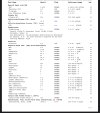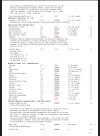Does anybody have amazon micro spoon dosages for Anadrol and Raloxifene?
You really should measure yourself though because sometimes the spoons can change sizes or your raws can be ground to a different size/shape which can affect how much a given volume of raw weights (more/less air in between particles, more/less moisture, etc).
The way to measure yourself is:
1) Get a good scale. Preferably one with a 0.1mg "resolution" and a minimum weight of <= 10 mg. Most scales have a minimum weight of at least 10mg and anything below that either doesn't read or is totally junk. And if the lowest weight it reads out is 10mg, I wouldn't trust anything below 25mg to be accurate. Please note a couple things: In a professional context, scales don't have "precision" and "accuracy"...at least those aren't scientific claimed marketing specifications. Instead it's generally "resolution", "repeatability", and "linearity". Basically no affordable analytical balance (<$500) publishes data on linearity, but go ahead and assume its decent, most are good enough for us. If you want to check if your scale is "good" you need two calibration weights somewhere sort just a little above and below the limits of what you're planning to measure.
So like, a 25mg weight and a 200mg weight if you want to measure 50mg. Or a 5 gram weight and a 50g weight if you want to measure 25 grams. Call the lower weight "A" and the higher weight "B". Whatever the scale reads with the lower calibration weight call "P" and whatever the scale reads with the higher calibration weight call "Q". Then when you weigh your raws, call whatever the scale says "X". Then use this equation to figure out what the "real" weight is cuz whatever the cheap scale says is gonna be wrong (which you'll realize when u put the calibration weights on and they dont match what the scale says, especially really light weights like 25mg).
"Real Weight" = ( (Q-P) / (B-A) ) (X - A) + P
2)
Even if your scale has a resolution of 0.1mg doesn't mean it can measure a 5mg dose. This is because it has a "minimum weight". For 0.1mg scales that's usually at least 10mg. For 1mg scales its usually at least 20mg. So to figure out how much a "scoop" is you'll need to scoop many many times until you've scooped at LEAST 2-3x the minimum weight. This could be 30mg, this could be 300mg. You need to record how many scoops it took to get to that weight. If you want, you can record what the scale says after each and every scoop to ATTEMPT to calculate a "variance" which is like, how much bigger one scoop is, and how much smaller the next scoop is. Maybe it's +/- 10%, maybe +/- 50%, who knows. But that will only "work" with a 0.1mg resolution scale, if you have a 1mg resolution scale you'll never be able to trust any difference from scoop to scoop.
Then you divide the total weight by the number of scoops and pray that every scoop was approximately the same size. The more scoops you did the more accurate the "average" will be but you still won't know if one scoop was twice the size of the others.
Good analytical balances are at least $300 (I mean, "decent" ones cost a lot more, but I'm not a millionaire). Calibration weights are pretty expensive too - the ones on amazon can't be trusted if you're really worried about dose weight. Actual real calibration weights can be bought from Mettler-Toledo. They’ll be $17 to $60 each. Get M1 class, without certificate, to save money.



